Tuberculosis
About Tuberculosis (TB)
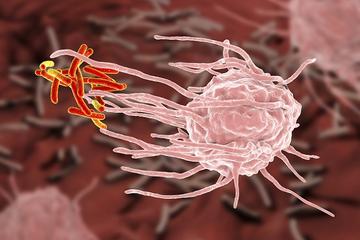
Macrophages engulfing mycobacterium tuberculosis
Tuberculosis (TB) is a disease caused by a bacterium, Mycobacterium tuberculosis (M.tb), and is found worldwide. In 2020 10 million people developed TB and 1.5 million died, making TB the greatest global infectious disease cause of death after COVID-19 and killing more people every year than HIV or malaria.
Aside from causing death TB impairs general health, resulting in reduced economic productivity and increased social and medical burdens on families. The World Health Organisation estimates 100 million disability adjusted life years are lost due to TB in India alone. The average total cost to a patient with TB in a low/middle-income country is US$538-1268, which is equivalent to a year’s wages for many sufferers. Furthermore, animal disease such as bovine (cow) TB also has a very significant effect on people’s livelihoods and the economic development of low and middle-income countries.
Where is TB found?
TB occurs in every part of the world. In the UK, where TB used to kill 1 in 4 people in Victorian times, only 5,000-6,000 people now develop TB each year. TB is a disease of poverty. The highest rates today are in sub-Saharan Africa, in countries such as South Africa (world map of TB disease).
Around one-third of the world’s population is latently infected with M.tb, which means they have been infected but do not yet have active TB disease. Latently infected people have a 10% chance of developing active TB during their lifetime, and becoming ill. This risk increases if they are also infected with HIV.
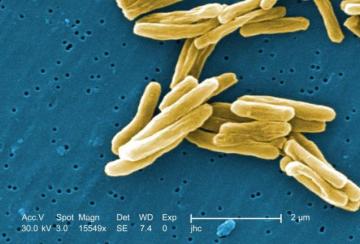
Mycobacterium tuberculosis (credit: CDC)
How is TB spread?
TB is spread by inhaling bacteria that have been coughed, sneezed or spat into the air.
What are the symptoms of TB?
TB usually affects the lungs causing symptoms such as coughing, fever, tiredness and weight loss, but it can also affect other parts of the body such as the spine and brain (NHS symptoms page). Eventually TB leads to death.
Is TB curable?
TB is curable but drug-resistant strains of the bacteria are increasing (map). Treatment takes six months, is very costly, and can have unpleasant side effects, while treatment of drug resistant strains of M.tb can take up to two years. So developing a vaccine that could prevent TB infection is an important global public health goal - reducing global TB rates by 90% by 2030 is UN Sustainable Development Goal #3.
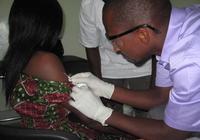
Vaccines against TB
The current TB vaccine is called BCG (Bacille Calmette-Guérin). BCG has been administered globally to several billion people, but it is over 90 years old and does not protect well against pulmonary (lung) TB. Pulmonary TB has the highest mortality and morbidity rates, so an improved vaccine is essential.
VALIDATE
At the VALIDATE Network, by bringing together TB researchers from around the world we hope to speed up progress towards an improved vaccine against this deadly disease.
Further Information:
‘Exposed: The Race Against TB’ – informative and interesting short films about TB and TB research
Medicins Sans Frontieres (MSF) - information and videos
World Health Organisation – Status of the Global TB Epidemic and Response infographic
World Health Organisation - End TB Strategy document
Mycobacterium tuberculosis (M.tb) is a pathogen with worldwide preponderance, which infects humans causing tuberculosis (TB), a transmissible disease resulting in very high mortality and morbidity. M.tb can also infect cattle and cause bovine TB and is very closely related to Mycobacterium bovis, which causes most bovine TB.
It is estimated that a third of the world’s population is latently infected with M.tb, and these people carry a 10% lifetime risk of developing active life-threatening disease (Dye 1999). In 2019, there were 10 million new cases worldwide and 1.4 million people died of TB (WHO 2019). Co-infection with human immunodeficiency virus (HIV) greatly increases risk of TB reactivation and death (Corbett 2006, Colditz 1994). The emergence of drug resistant strains of M.tb has further compounded the problem. The diagnosis of TB is challenging and drug treatment can be prolonged, harmful, costly and complex. For these reasons an effective vaccine is a global public health priority. An effective vaccine could revolutionise TB control (McShane 2011).
The challenges of developing a TB vaccine
Developing an effective TB vaccine is not easy. We already have a vaccine, BCG, which is one of the world’s most widely used vaccines. BCG was first developed in 1921. When given at birth, BCG is good at protecting against severe disease in childhood. However the protection it confers against lung disease, particularly in adults, is highly variable. We urgently need a more effective vaccine.
Some of the scientific challenges in TB vaccine development are:
Lack of immune correlates
For some vaccines, we know exactly the level of a particular kind of immune response that is needed for the vaccine to work – i.e. to stop someone getting disease. For TB, we do not know what kind of immune response is needed, let alone what level of response is required. This means we can only test if a vaccine works in humans by doing large, expensive and time consuming human efficacy trials. This limits the number of vaccines that can be tested in humans.
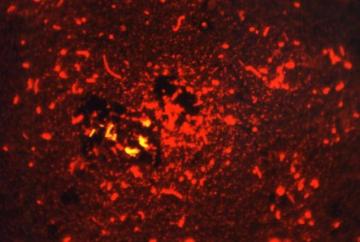
Fluorescent acid-fast stained smithwick photomicrograph of Mycobacterium tuberculosis (credit: CDC)
Uncertain predictive value of animal models
It is not possible to test a vaccine in humans without testing it first in animals. However we do not know which if any of the animal models best predicts efficacy in humans. Again, this means we can only determine if a vaccine will work in humans by testing it in large, expensive, human efficacy trials.
Difficulty of working with TB in the lab
M.tb is a highly infectious pathogen, which means we can only safely work with it in the lab using special containment measures (called Category or BSL 3). This limits the number of laboratories that can work on M.tb.
The variable efficacy of BCG
The currently available vaccine, BCG, works very well in the UK but does not work in India, Africa or other countries where TB remains endemic. We do not fully understand the reason for this but it is important that any new vaccine works well across the world, including in the high burden countries most in need of an effective vaccine.
How VALIDATE is helping
By bringing together researchers working on different (but similar) pathogens, discoveries in one field can be more quickly taken advantage of in research against another pathogen. Bringing together researchers from different disciplines and institutes in new collaborations means knowledge can be exchanged and new research ideas for the field can be generated and investigated. Bringing new researchers into this field, and progressing the careers of early career researchers, will aid with new ideas and the continuation of the field into the future.
Further reading (see also our Publications page)
- Brazier B & McShane H. Towards new TB vaccines. Semin Immunopathol. 2020 Jun;42(3):315-331.
- Scriba TJ, Coussens AK, Fletcher HA. Human Immunology of Tuberculosis. Microbiol Spectr. 2017 Jan;5(1).
- Hatherill M, Tait D, McShane H. Clinical Testing of Tuberculosis Vaccine Candidates. Microbiol Spectr. 2016 Oct;4(5).
- Raviglione M, Sulis G. Tuberculosis 2015: Burden, Challenges and Strategy for Control and Elimination. Infect Dis Rep. 2016 Jun 24;8(2):6570.
- Cardona PJ, Williams A. Experimental animal modelling for TB vaccine development. Int J Infect Dis. 2017 Mar;56:268-273.
- World Health Organisation - End TB Strategy document.
References
1. Dye, C., et al., Consensus statement. Global burden of tuberculosis: estimated incidence, prevalence, and mortality by country. WHO Global Surveillance and Monitoring Project. JAMA, 1999. 282(7): p. 677-86.
2. WHO, Tuberculosis Factsheet 2020. (accessed 15/12/20).
3. Corbett, E.L., et al., Tuberculosis in sub-Saharan Africa: opportunities, challenges, and change in the era of antiretroviral treatment. Lancet, 2006. 367(9514): p. 926-37.
4. Colditz, G.A., et al., Efficacy of BCG vaccine in the prevention of tuberculosis. Meta-analysis of the published literature. JAMA, 1994. 271(9): p. 698-702.
5. McShane, H., Tuberculosis vaccines: beyond bacille Calmette-Guerin. Philos Trans R Soc Lond B Biol Sci, 2011. 366(1579): p. 2782-9.
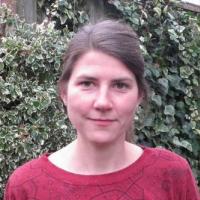
Natural variation of the bovine lymph node microenvironment and its possible effect on BCG immunogenicity
Led by Dr Lucia Biffar (University of Oxford, UK), with Dr Bernardo Villarreal-Ramos (APHA, UK) and Prof Tracy Hussell (University of Manchester, UK)
Read more here

Enhancing BCG efficacy: the Social Technology Lab Initiative
Led by Assist Prof Delia Boccia (LSHTM, UK), with Dr Jenn Dowd (KCL, UK), and Prof Helen Fletcher (LSHTM, UK)
Read more here

Establishment of a functional assay panel to evaluate the role of antibodies in defence against melioidosis and tuberculosis
Led by Dr Panjaporn Chaichana (MORU, Thailand), with Prof Susanna Dunachie (University of Oxford, UK), and Prof Helen Fletcher (LSHTM, UK)
Read more here

Overcoming innate immune tolerance in the respiratory tract for optimal vaccine design
Led by Dr Rajko Reljic (SGUL, UK) with Prof Tracy Hussell (University of Manchester, UK)
Read more here

How do functional and metabolic characteristics of trained monocytes affect their anti-bacterial activity?
Led by Asst Prof Steven Smith (LSHTM, UK), with Dr Javier Sanchez-Garcia (Instituto Politécnico Nacional, Mexico), Prof Jo Prior (dstl, UK), and Prof Gregory Bancroft (LSHTM, UK)
Read more here

Vaccines to target people with diabetes: characterising the pathways of immune response to M. tuberculosis and B. pseudomallei in people with diabetes compared to non-diabetics
Led by Prof Susanna Dunachie (University of Oxford, UK), with Assistant Prof Jacqueline Cliff (LSHTM, UK), and Prof Gregory Bancroft (LSHTM, UK)
Read more here

Identification of Leishmania donovani and Mycobacterium tuberculosis- derived proteins on the surface of infected macrophages that are associated with ADCC induction
Led by Dr Mohamed Osman (University of York, UK), with Prof Paul Kaye (University of York, UK), Dr John Pearl (University of Leicester, UK) and Prof Andrea Cooper (University of Leicester, UK)
Read more here

Identification of latency associated antigens and biosignatures associated with Mycobacterium tuberculosis
Dr Jomien Mouton (University of Stellenbosch, South Africa) - VALIDATE Fellowship
Read more here

Characterising the BCG-induced antibody response to inform the design of improved vaccines against M.tuberculosis, M.leprae and M.bovis
Dr Rachel Tanner (University of Oxford, UK) - VALIDATE Fellowship
Read more here
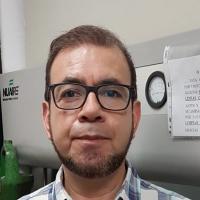
Metabolic reprogramming of skin microenvironment for improved BCG vaccine efficacy
Led by Titular Prof Francisco Javier Sánchez-García (Instituto Politécnico Nacional, Mexico), with Dr Steven Smith (LSHTM, UK), Dr Barbara Kronsteiner-Dobramysl (University of Oxford, UK) and Prof Hazel Dockrell (LSHTM, UK)
Read more here

Development of an RNA based vaccine against Mycobacterium tuberculosis
Led by Dr Rhea Coler (IDRI, USA), with Prof Helen Fletcher (LSHTM, UK)
Read more here
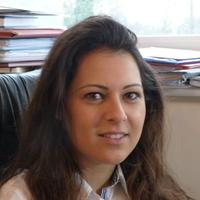
Developing a mouse model of diabetes to evaluate vaccines for TB and melioidosis
Led by Dr Elena Stylianou (University of Oxford, UK), with Prof Helen McShane (University of Oxford, UK), Assoc Prof Susanna Dunachie (University of Oxford, UK), Assoc Prof Paul Brett (University of Nevada, USA), Dr Barbara Kronsteiner-Dobramysl (University of Oxford, UK) and Dr Panjaporn Chaichana (MORU, Thailand)
Read more here

Cross protection against TB by attenuated Mycobacterium ulcerans strain 5114
Led by Dr Justice Boakye-Appiah (SGUL, UK), with Dr Rajko Reljic (SGUL, UK) and Dr Tufária Mussá (Eduardo Mondlane University, Mozambique)
Read more here

Characterising the cellular immunity and metabolic response to Mycobacterium tuberculosis and Burkholderia pseudomallei in Indian patients for vaccine design
Led by Prof Chiranjay Mukhopadhyay (Manipal Academy of Higher Education, India), with Prof Susanna Dunachie (University of Oxford, UK) and Prof Mitali Chatterjee (IPGMER, India)
Read more here

T cell receptor sequencing to identify correlates of protection in human tuberculosis vaccine studies
Led by Dr Gabriele Pollara (UCL, UK), with Prof Mahdad Noursadeghi (UCL, UK), Assoc Prof Susanna Brighenti (Karolinska Institutet, Sweden), Assoc Prof Senait Ashenafi (Addis Ababa University, Ethiopia) and Prof Benny Chain (UCL, UK)
Read more here

An ex vivo model for understanding the impact of vaccination on Mycobacterial persister populations
Led by Prof Samantha Sampson (Stellenbosch University, South Africa), with Asst Prof Andrea Zelmer (LSHTM, UK) and Dr Jomien Mouton (Stellenbosch University, South Africa)
Read more here

Investigating the BCG-induced Natural Killer (NK) cell response in cattle and humans
Led by Dr Iman Satti (University of Oxford, UK), with Asst Prof Stephen Cose (UVRI, Uganda), Prof Helen McShane (University of Oxford, UK), Prof Alison Elliott (UVRI, Uganda) and Prof Jayne Hope (University of Edinburgh, UK)
Read more here

Cytomegalovirus as a risk factor for TB and leishmaniasis
Led by Dr Lisa Stockdale (University of Oxford, UK), with Dr Robindra Basu Roy (LSHTM, UK), Dr Vivian Tamietti Martins (Federal University of Minas Gerais, Brazil), Assoc Prof Eduardo Coelho (Federal University of Minas Gerais, Brazil), and Prof Helen Fletcher (LSHTM, UK)
Read more here
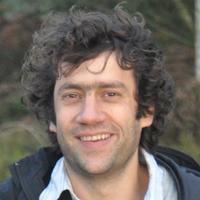
Innovative tools to measure mycobacterial antigen expression in tissue
Led by Dr Simon Waddell (University of Sussex, UK), with Dr Javier Salguero Bodes (PHE, UK), Prof Gobena Ameni (Addis Ababa University, Ethiopia), Dr Sally Sharpe (PHE, UK) and Dr Ann Rawkins (PHE, UK)
Read more here


